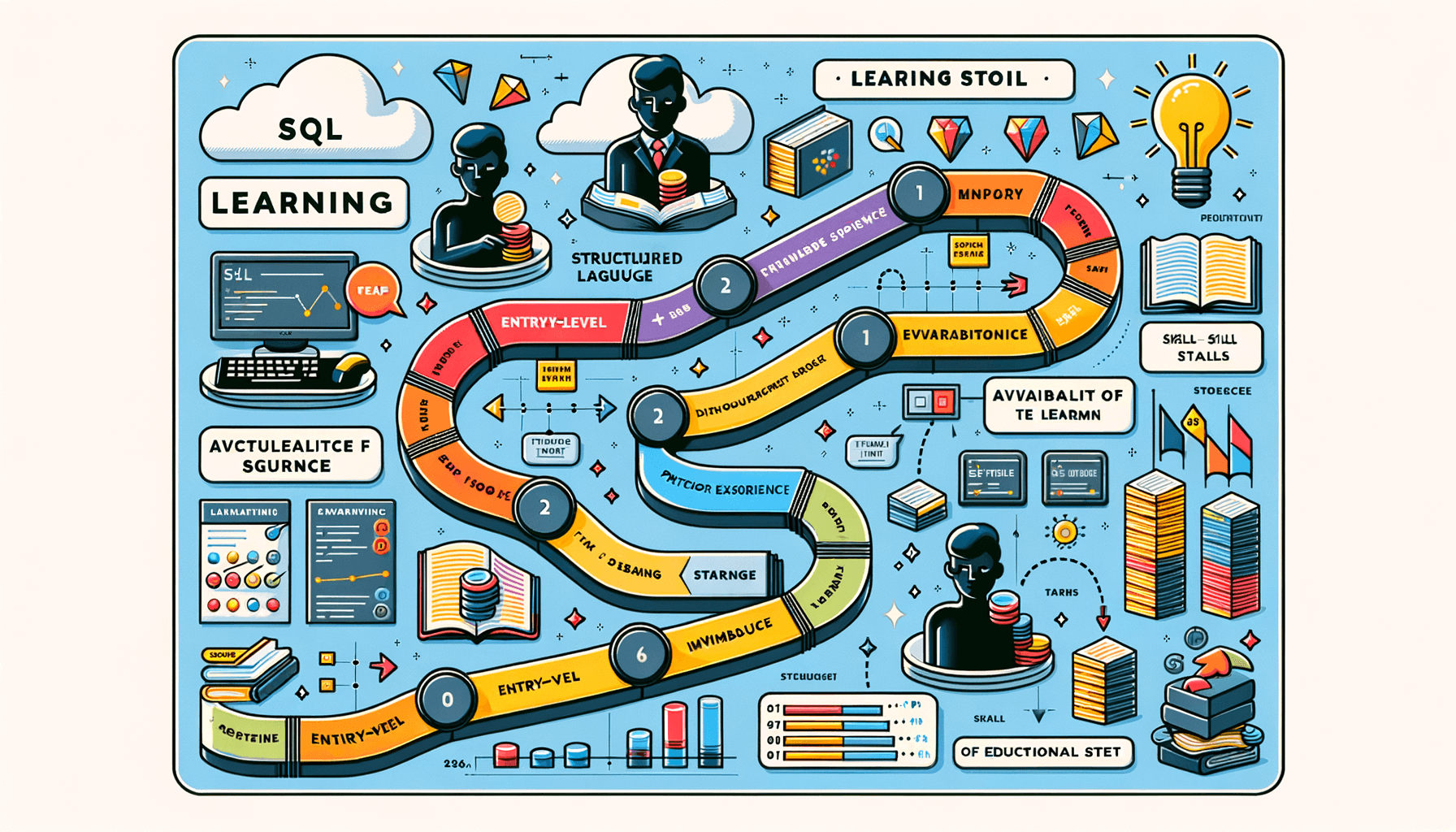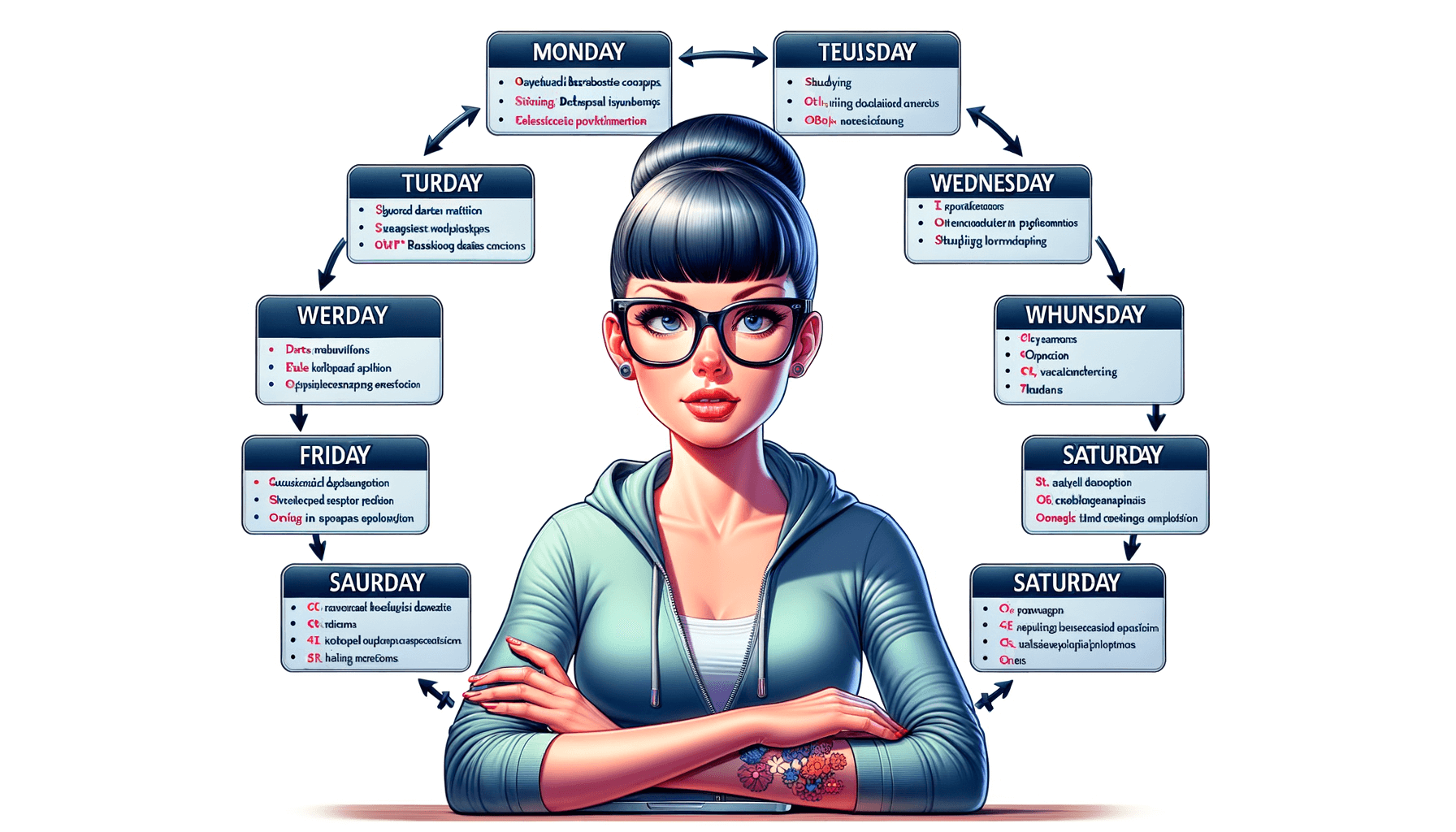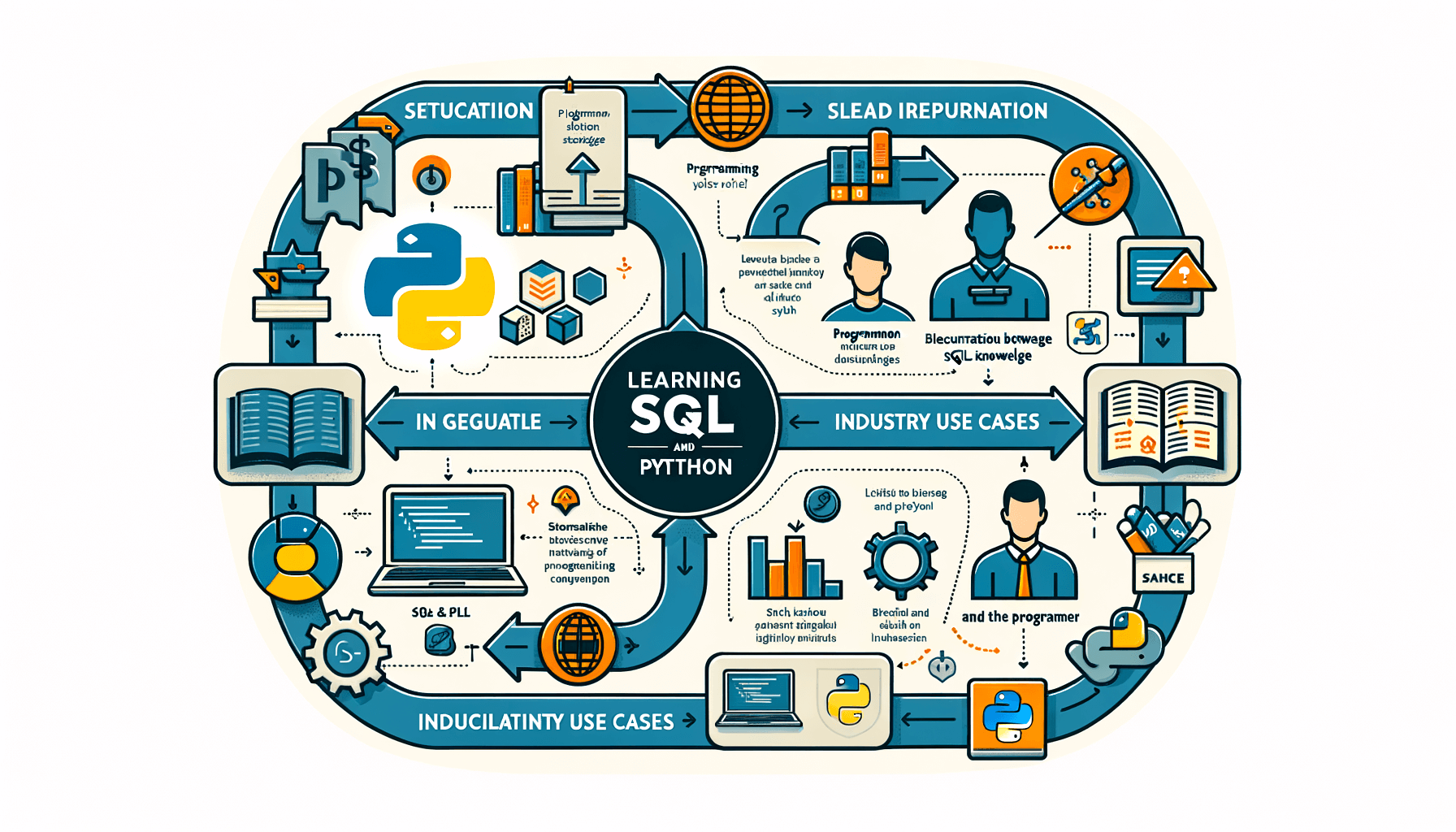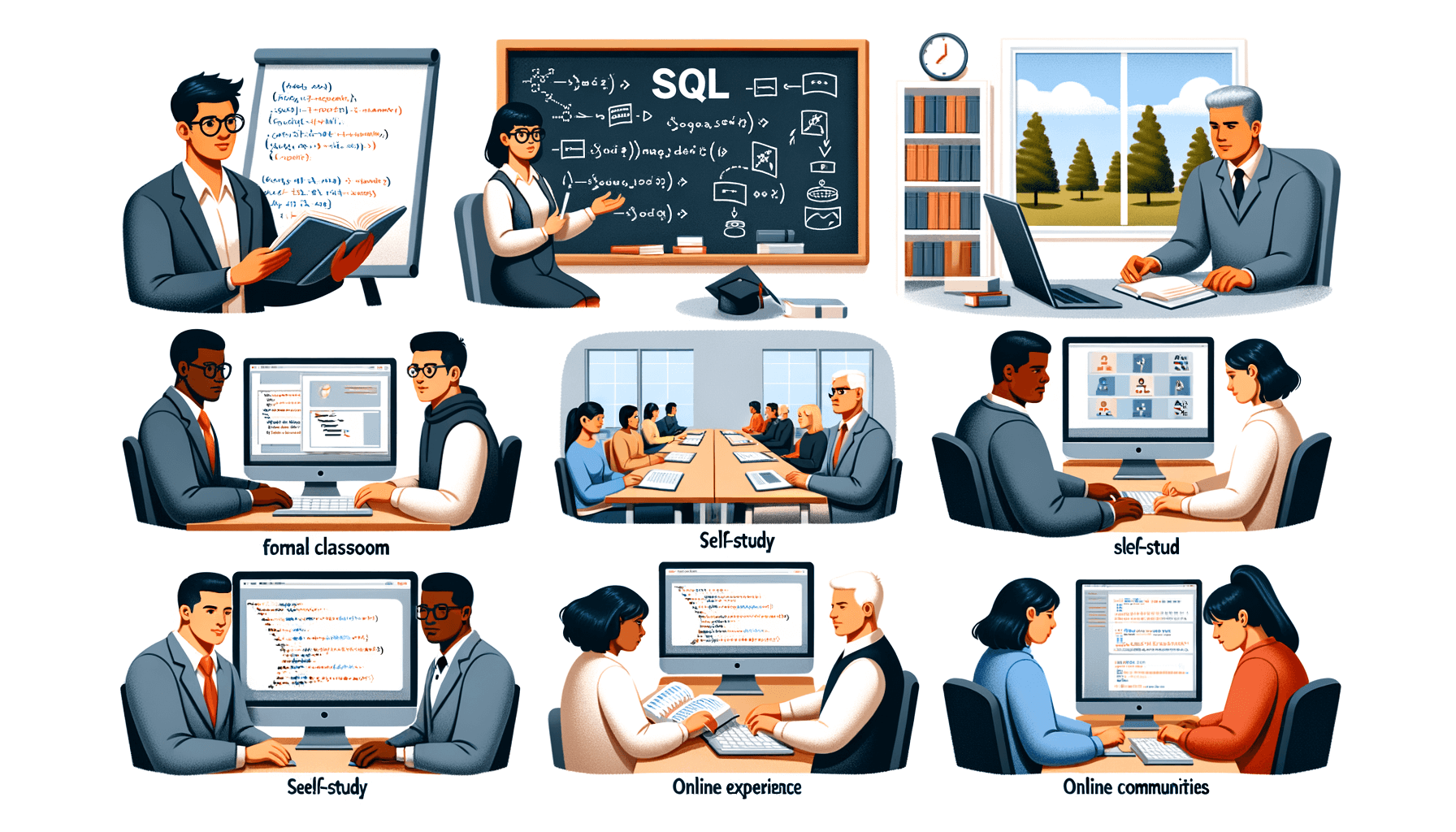A big variety of articles and resources

How Long It Takes to Learn SQL: A Comprehensive Guide
 Sia Author and Instructor
Learn SQL
Sia Author and Instructor
Learn SQL
10 minute read
Learning SQL can open many doors in the tech world, whether you're looking to become a data analyst, a web developer, or just improve your tech skills. The time it takes to learn SQL depends on several factors like your previous coding experience, the resources you use, and how much time you can dedicate to studying. This guide will break down the basics, intermediate, and advanced topics of SQL, and help you estimate how long it might take to become proficient.
Key Takeaways
- The time it takes to learn SQL varies based on your prior programming knowledge and experience.
- Basic SQL concepts include understanding databases, SQL syntax, and data manipulation.
- Intermediate skills involve learning about joins, subqueries, indexes, and stored procedures.
- Advanced techniques cover query optimization, complex data types, and SQL's role in big data.
- Real-world applications of SQL include web development, data analysis, and business intelligence.
Factors Influencing the Time to Learn SQL
Prior Programming Experience
Our previous experience with programming can greatly affect how quickly we learn SQL. If we already know another programming language, we might find SQL easier to pick up. Having a background in coding helps us understand SQL's logic and structure faster.
Learning Resources
The quality and type of learning resources we use also play a big role. There are many options available, from online courses to books and tutorials. For example, a blog page on sqlskillz.com with articles on learning SQL quickly, valuable SQL skills, and free resources can be very helpful. We should subscribe for updates and compare with other learning platforms to find the best fit for us.
Time Commitment
How much time we dedicate to learning SQL each day or week will impact our progress. Consistent practice is key. Setting aside regular study time helps us retain information and build our skills steadily. Even a small daily commitment can lead to significant improvement over time.
Basic SQL Concepts and Their Learning Curve
Understanding Databases
When we start learning SQL, the first thing we need to understand is databases. Databases are like digital filing cabinets where we store and organize data. They help us keep track of information in a structured way. Knowing how databases work is crucial because SQL is the language we use to interact with them.
SQL Syntax and Commands
Next, we dive into SQL syntax and commands. SQL has its own set of rules and words that we need to learn. These commands let us do things like add, change, or delete data in a database. It's like learning the grammar of a new language. We can find many resources online, such as sqlskillz.com vs udemy.com, to master these basics at our own pace.
Data Retrieval and Manipulation
Finally, we learn how to retrieve and manipulate data. This means we can ask the database questions and get answers. For example, we can find out how many students are in a class or what the average test score is. This skill is very useful in many jobs, from web development to data analysis.
Understanding these basic concepts is the first step in our SQL journey. With practice, we can become more comfortable and start exploring more advanced topics.
Intermediate SQL Skills and Their Mastery
Joins and Subqueries
When we move beyond the basics, we encounter joins and subqueries. These tools allow us to combine data from multiple tables or perform nested queries. Mastering joins and subqueries is crucial for handling complex data relationships. We can use different types of joins, like INNER JOIN, LEFT JOIN, and RIGHT JOIN, to fetch data based on specific conditions.
Indexes and Performance Tuning
Indexes are like the index of a book, helping us find information quickly. They speed up data retrieval but can slow down data modification. We need to balance the use of indexes to optimize performance. Performance tuning involves analyzing query execution plans and making adjustments to improve efficiency.
Stored Procedures and Functions
Stored procedures and functions are reusable blocks of code that perform specific tasks. They help us automate repetitive tasks and ensure consistency. By using stored procedures, we can encapsulate complex logic and improve code maintainability. Functions, on the other hand, return a single value and can be used in SQL statements to simplify complex calculations.
As we delve into intermediate SQL skills, we start to see the power and flexibility of SQL in managing and manipulating data. These skills are essential for anyone looking to advance their SQL proficiency.
Advanced SQL Techniques and Their Complexity
Advanced Query Optimization
When we dive into advanced query optimization, we focus on making our SQL queries run faster and more efficiently. This involves understanding how the database engine processes queries and finding ways to reduce the time it takes to get results. Optimizing queries can be a game-changer, especially when dealing with large datasets.
Complex Data Types and Structures
In this section, we explore the use of complex data types and structures in SQL. These include arrays, JSON, and XML data types, which allow us to store and manipulate more intricate data. Handling these data types requires a deeper understanding of SQL and can significantly enhance our ability to manage diverse data.
SQL in Big Data and Analytics
SQL plays a crucial role in big data and analytics. By leveraging SQL, we can query massive datasets and extract valuable insights. This is particularly important in fields like business intelligence and data science, where the ability to analyze large volumes of data quickly is essential. A mini course: SQL functions and techniques can help us enhance SQL skills with advanced functions, sorting techniques, data handling, and analytical techniques. This knowledge can give us a competitive edge in BI.
Mastering advanced SQL techniques not only improves our efficiency but also opens up new possibilities in data management and analysis.
Practical Applications of SQL in Real-World Scenarios
In our exploration of SQL, we find that it plays a crucial role in various fields. SQL is essential for managing data effectively, and its applications are vast. Here are some key areas where SQL is commonly used:
- SQL in Web Development: Many websites rely on databases to store user information, product details, and more. SQL helps developers retrieve and update this data efficiently.
- SQL for Data Analysis: Analysts use SQL to extract insights from large datasets. By running queries, they can identify trends and make informed decisions.
- SQL in Business Intelligence: Companies utilize SQL to generate reports and dashboards that visualize data. This helps stakeholders understand performance and strategize accordingly.
To illustrate the importance of SQL in these areas, we can look at the following table:
| Application Area | Key Benefit |
|---|---|
| Web Development | Efficient data management |
| Data Analysis | Insight extraction from datasets |
| Business Intelligence | Visualization of performance data |
SQL is not just a tool; it is a gateway to understanding and leveraging data in our daily tasks.
In conclusion, mastering SQL opens up numerous opportunities in various fields, making it a valuable skill for anyone interested in technology and data management. By engaging with resources like the sqlmicro course, we can gain essential knowledge and confidence in our SQL abilities, preparing us for real-world challenges.
Estimating the Time Required to Achieve Proficiency in SQL
Beginner Level Proficiency
For those starting from scratch, reaching a beginner level in SQL can take anywhere from a few weeks to a couple of months. This timeline assumes a consistent study schedule and access to quality learning materials. Hands-on practice is crucial at this stage, as it helps solidify basic concepts and commands.
Intermediate Level Proficiency
Achieving intermediate proficiency typically requires several months of dedicated learning and practice. At this level, learners dive into more complex topics like joins, subqueries, and performance tuning. Engaging in real-world problems and projects can significantly enhance understanding and skill development.
Advanced Level Proficiency
Mastering advanced SQL skills can take a year or more, depending on the individual's dedication and the complexity of the topics. Advanced proficiency involves deep knowledge of query optimization, complex data structures, and the application of SQL in big data and analytics. Continuous learning and tackling challenging projects are essential for reaching this level.
The journey to SQL proficiency is unique for each individual, influenced by factors such as prior experience, learning resources, and time commitment. With persistence and the right approach, anyone can achieve their desired level of expertise in SQL.
Common Challenges and How to Overcome Them
Debugging SQL Queries
Debugging SQL queries can be tricky, especially for beginners. Errors in syntax or logic can lead to unexpected results. To tackle this, we should break down queries into smaller parts and test each part separately. Using tools like SQL query analyzers can also help identify issues quickly.
Handling Large Datasets
Working with large datasets can be overwhelming. Queries may run slowly or even time out. To manage this, we can use indexing to speed up data retrieval. Additionally, breaking down large tasks into smaller, more manageable chunks can make the process easier.
Dealing with SQL Security Issues
Security is a major concern when working with SQL. We must ensure that our databases are protected from unauthorized access. This involves using strong passwords, encrypting sensitive data, and regularly updating our security protocols. By following these steps, we can safeguard our data effectively.
Remember, gaining practical SQL skills with real-world problems requires effort and persistence. With hands-on projects and expert-led training, we can overcome these challenges and become proficient in SQL.
Facing challenges is a part of learning, but don't let them hold you back. Whether it's mastering SQL or understanding complex concepts, our courses are designed to help you succeed. Visit our website to explore our course catalog and find the perfect fit for your needs. Start your journey with us today and overcome any obstacle in your path!
Conclusion
Learning SQL is a journey that varies for everyone. Some may pick it up quickly, while others might take a bit longer. The key is to practice regularly and not get discouraged by challenges. With dedication and the right resources, anyone can become proficient in SQL. Remember, the more you use it, the better you'll get. So, keep practicing and exploring new ways to use SQL in real-world scenarios. Your hard work will pay off in the end.
Frequently Asked Questions
How long will it take to learn SQL if I have no programming experience?
If you have no programming background, it might take you about 2 to 3 months to get comfortable with basic SQL. This assumes you study a few hours each week.
Can I learn SQL on my own?
Yes, you can learn SQL on your own using online tutorials, courses, and books. There are many free resources available to help you get started.
What are some good resources to learn SQL?
Some good resources include online courses like those on Coursera or Udemy, SQL textbooks, and free tutorials from websites like W3Schools and Khan Academy.
Is SQL hard to learn?
SQL is considered one of the easier programming languages to learn. The basics are straightforward, but mastering advanced topics can take more time and practice.
How can I practice SQL?
You can practice SQL by using online platforms like LeetCode, HackerRank, or even by setting up your own database and working on projects. Practicing regularly is key to getting better.
Do I need to know math to learn SQL?
You don't need advanced math skills to learn SQL. Basic arithmetic and understanding of data structures will be enough for most tasks you'll encounter.
Related Articles

Can a programmer master SQL in a week?
13 minute read

Do I still need to learn SQL if I already know Python?
13 minute read

How did you learn SQL? Did you have a teacher?
14 minute read




